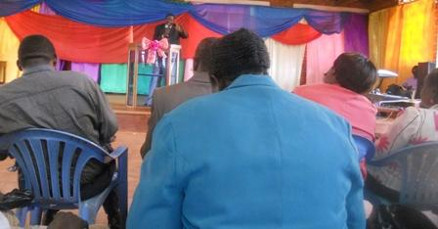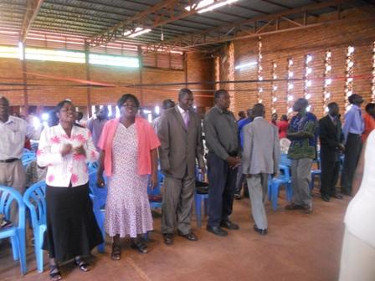(attended by 320 people)
TEXT: 2Corithians 8:1-5 “Now, brethren we wish to make known to you the grace of God which has been given to the churches of Macedonia that in great ordeal of affliction their abundance of joy and their deep poverty overflowed in the wealth of their liberality, for I testify that according to their ability, and beyond their ability, they gave of their own accord begging us with much urging for the favor of participation in the support of saints, and this not, as we had expected, but they first gave themselves to the Lord and to us by the will of God. (2 Corinthians 8:1-5 NASB)
THEME: The Anemic Churches

INTRODUCTION: Macedonia was an impoverished region of Northern Greece. Apostle Paul was referring to the churches at Philippi, Thessalonica and Berea. This region was ravaged by many wars, and suffered the Roman policy of heavy taxation to keep the residence absolutely poor and submissive.
In spite of their suffering and severe economic depravity, people gave beyond their means to meet the needs of others whom they believed needed more help than they did.
The Macedonian people were selfless, having given their lives to the Lord first. They gave freely within and beyond their means. God does not set limits on our giving but expects people to give liberally. God’s people should not give under compulsion, manipulation, coercion or intimidation.

Money is the blood (life) of the church. Without money, the church is likened to an anemic person. Anemia is described as condition when the number of red blood cells or concentrations of hemoglobin are low. Hemoglobin is a protein (metalloprotein) inside the red blood cells that contains iron and transports oxygen. Some of the characteristics of anemic persons are, easily fatigued and loss of energy, shortness of breath and headache, particularly with exercise, dizziness and insomnia. Such a person is considered a patient and is not worth to perform his or her duties effectively.
The purpose of a local church in a given locality: It is important for each believer in Christ to be part of the local church where he or she is nurtured and gets involved in building the body of Christ. God has two basic reasons for any local church in a given location. Each of the two reasons requires material resources (money). Without sufficient resources, the local church is rendered non-functional, redundant, or half-dead.
(i) Reason One: The local church functions as the arm of the Lord to meet the needs of the poor. The poor must be clearly identified and separated from the Lazy, who dread work, (Proverbs 6:6-11).
From the inception of the church after the descent of the Holy Spirit on the day of Pentecost, the Church immediately faced the dilemma of the poor. They did not simply ignore it, but worked out the solution of the problem, (Acts 6:1-5).
The poor should be top priority in any local church community. When Paul was coming to ministry, Pillars of the Church, (Peter, John and James) tried to caution him of the noble task of caring for the poor. Paul and Barnabas needed no reminder because the Lord had already revealed that to them, (Galatians 2:9-10).
From the beginning of the nation of Israel, God had given very clear laws and policies regarding the poor and the vulnerable in their communities. Such policies as gleaning were meant to benefit the poor. What is amazing is the day of final judgment of mankind. The Lord will consider the physical services rendered unto the poor as a criteria for deciding (Mathew 25:31-36).
Some people have begun churches as an income generation and call them their religions. I always joke with them to find out if their religion has met the Biblical standard of James 1:26.
Apart from the constant poor, there are natural catastrophes such as famine outbreak, conflict, earth quake and mudslides, floods, tornadoes, etc. In an event of such occurrence, immediate intervention is expected from the church first. These would require prayer, then intervention with material resources. As James puts it, practical faith is louder than professed faith devoid of action. (James 2: 14-20).
(ii) Reason Two: To win souls and make disciples for Jesus Christ. Evangelism and discipleship is a key factor in the existence of the church; that is the essence of the Great Commission (Mathew 28:18-20). The disciples were instructed to remain in Jerusalem waiting for the promises of the Holy Spirit to enable them have power to be witnesses of Jesus Christ throughout the whole earth, (Acts 1:8). The gospel has to reach the people. Some one has to take the gospel, and that some one must be sent – (Romans10:14-15). Besides taking the gospel, the believers have to be fed constantly in the Word and guided through counseling. All these are Biblically entitled to support. (1Corinthians 9:13-14, 1Timothy 9:13-14).
The Local Church Revenue Sources: If the local church has to fulfill her obligations above, then it has to have revenue sources as well as clear administration of the resources. This enhances confidence among the donors (congregation). Just like any institutional donor agency, accountability and effectiveness in dealing with money is a prerequisite to continuous flow of funding.
Biblically Clear Revenues are:
(i) Regular Offerings: These are thanksgiving offerings brought to God regularly each time there is a church meeting or fellowship. It is a love offering which should be given cheerfully as part of the worship to God, as directed to Israel not to appear before Him empty-handed. (Exodus 23:15, Dueteronomy 16:16-17). It should really be without blemish, (Exodus 12:5; Leviticus 19:3, Numbers 6:4).
(ii) Designated Offerings: This is not a permanent offering, but short term to meet a specific need, and there after it stops. It could be a response to emergency humanitarian need, or anything that need immediate intervention. Moses did fund-raising for specific projects given by God, (Exodus 25:1-9; 35:4-9). Again, in most communities in Africa, the enemy has hijacked this area of special offerings for elaborate marriage and graduation feasts, with total negligence of the poor, sick and vulnerable people.
(iii) Tithes (10%) of all Incomes. Although this is not a condition for salvation, many church leaders try to intimidate people into paying it. Tithing is Biblical, an expression of acknowledgment of God as the provider, (Malachi 3:8-12). This message was for Israel in their time of economic distress. I believe it is quite applicable to the church as well. There is tremendous blessing in correct tithing. By all means, if the tithe giver is in great need, the tithe may be borrowed from God and paid with interest of 20% (Leviticus 27:31). Tithes were taken to store houses, which in our case is to the church, not to an individual. Tithes supported the Levites and, the poor. Today the gospel ministers are not the exact parallels of Leviticus priests who must depend on the church entirely. Paul set an example of tent-building, which is a honorary example to Church ministers to work and earn a living somewhere else, (2Thessolonians 3:6-15).
(iv) First Fruits: Israel at that time was predominantly an agricultural economy. Every first fruit was to be given in honor of the Lord, (Proverbs 3:9-10). I believe this can be worked out even in a cash-income-earning community. Some people have devoted their entire first earning in honor of the Lord. This, however, should not be taken as a law, but the people who do it, should be allowed freedom to do it without compulsion, purely as loving honor to the Lord their God.
Management of Church Resources: One of the chief causes of lack of funds in many churches is because people have lost the morale of giving, due to poor management of resources and absence of transparency. In such cases, financial systems are quite opaque and only beneficial to the Pastor. Such churches seem like an economic enterprise for an individual. Deacon board or church eldership may exist, but dance to the tune of the pastor and members of his family. I believe this is not the function of the gift of administration mentioned in the Scriptures, (2 Corinthians 8:16-24, 1Corinthians 12:28).
I believe it is wise for the head of the church to concentrate on core spiritual matters, such as preaching, teaching, counseling, prayer and leave direct handling of financial resources to trusted people with a gift of administration, the way the early church apostles saw it. (Acts 6:2-5) .Administration of church funds should focus on Biblical areas, such as supporting workers (salary), the poor and evangelism.
By having some one else, rather than pastor, handle church funds, protects the pastor’s integrity, and boosts the confidence of church members. Administrative team need to give regular updates to the congregation of income, expenditure, debts and surpluses. Expenditure projections, budget and budget discipline are very crucial in administration of church funds.
Money is a very important factor in the church, for which a church leader must exercise restrain and live within his means, with much contentment. (1Timothy 6:6-11). Many times the devil has used this area of finances to break fellowships.
Summary: Money per se (by itself) is not evil, but very necessary for the operation of the church. A church with sufficient income is likened to a healthy person who is capable of work.
